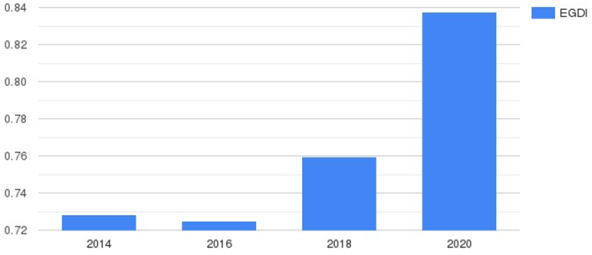E-government is a modern tool of relations between the state and society, as well as improving public administration. In world practice, there is no single scheme for the creation and realization of stages of e-government implementation. In various countries, the formation and promotion of the e-government system was carried out unequally and inconsistently. The technological and financial capabilities of society, the level of political culture of the population, the nature of the political system, the level of access to education and information must be taken into account for the effective implementation of e-government.
The article provides information about the levels of e-government development in the Republic of Kazakhstan and other countries.
The reasons for the relevance of this topic is that thanks to the implementation of e-government, the following happens: reduction of time, labor, financial expenses of the state and citizens; increasing the quality of services provided by the state to citizens; improving the mechanism and system of public administration; the system is becoming more open and citizens' control over the activities of the government machinery is increasing.
Keywords: e-government, public administration, E-Government Development Index (EGDI), the United Nations
Today, e-government is considered one of the main elements of the formation of modern society. It makes the work of government more open, efficient and accessible to citizens. In most countries, e-government is mistakenly considered only as a widespread introduction and application of modern mobile electronic-information technologies in the field of public administration. However, in this case, technologies are only a means in the system of transforming the relations of the state with citizens, legal entities or government authorities. We can say that this creates a new kind of public administration.
The level of e-government progress can be assessed on the basis of the e-government Development Index, published by experts of the UN (Department of social and economic development). It consists of several indicators: Online Service Index; Telecommunication Infrastructure Index; Human Capital Index [1]. Each of these indicators, in turn, is calculated based on dozens of indicators.
Table 1 shows the top-5 countries and Kazakhstan in the UN's Review on the level of the e-government Development in 2014–2020.
Table 1
UN E-Government Survey in 2014–2020
|
№ |
EGDI, 2014 |
EGDI, 2016 |
EGDI, 2018 |
EGDI, 2020 |
Trendline of EGDI, 2014–2020 |
|
1 |
South Korea 0.9462 |
United Kingdom 0.9193 |
Denmark 0.9150 |
Denmark 0.9758 |
4x * South Korea
|
|
2 |
Australia 0.9103 |
Australia 0.9143 |
Australia 0.9053 |
South Korea 0.9560 |
4xAustralia
|
|
3 |
Singapore 0.9076 |
South Korea 0.8915 |
South Korea 0.9010 |
Estonia 0.9473 |
2xUnited Kingdom ( 8 ** 0.8695–2014, 7 0.9358–2020)
|
|
4 |
France 0.8938 |
Singapore 0.8828 |
United Kingdom 0.8999 |
Finland 0.9452 |
2xSingapore ( 7 0.8812–2018, 11 0.9150–2020)
|
|
5 |
Netherlands 0.8897 |
Finland 0.8817 |
Sweden 0.8882 |
Australia 0.9432 |
2xFinland ( 10 0.8449–2014, 6 0.8815–2018)
|
|
2xDenmark ( 16 0.8162–2014, 9 0.8510–2016)
|
|||||
|
1xNetherlands ( 7 0.8659–2016, 13 0.8757–2018, 10 0.9228–2020)
|
|||||
|
1xFrance (10 0.8456–2016, 9 0.8790–2018,
19
0.8718–2020)
|
|||||
|
1xSweden ( 14 0.8225–2014, 6 0.8704–2016, 6 0.9365–2020)
|
|||||
|
1xEstonia ( 15 0.8180–2014, 13 0.8334–2016, 16 0.8486–2018)
|
|||||
|
0xKazakhstan ( 28 0.7283–2014, 33 0.7250–2016, 39 0.7597–2018, 29 0.8375–2020)
|
*How many times country has been in the top-5
**Place in the ranking that is not in the top-5
According to table 1, it can be seen that among the top-5 leading countries on the level of the e-government Development there are 7 European countries, 2 Asian countries and 1 country from Oceania. There are various models for the formation and implementation of e-government. Today there is no single model that could meet all the conditions and solutions for the formation of e-government. This is due to the fact that each country has its own characteristics, priorities and different levels of necessary resources for the completion of this task [2].
As can be seen from table 1, the highest position Kazakhstan ranked in 2014 (28th place). Today the country ranks 29th. Since 2018 Kazakhstan has risen by 10 positions. This suggests that the pace of development of e-government capabilities in Kazakhstan is unstable. This fact is also confirmed in figure 1, which shows the e-government Development Index of Kazakhstan in 2014–2020.

Figure 1. The e-government Development Index of Kazakhstan in 2014–2020
Kazakhstan has passed 4 stages of formation and implementation of e-government: Informational (2004–2006) — development and launch of the portal/content filling; Interactive (2007–2009) — provision of online services/ implementation of departmental information systems, state databases, electronic licensing, e-government gateway; Transactional (2010–2011) — possibility of online payment of state duties, fees, fines, utilities/introduction of electronic public procurement for entrepreneurs; Transformational (2012–present) — combining interactive and transactional services into integrated services/to achieve high efficiency in providing services to citizens [3].
We can say, e-government is being actively implemented in Kazakhstan and the country is one of the leaders in Asia in this direction. It demonstrates significant progress in the development of e-government and its implementation in the daily life of the country and society.
To further ensure the effective functioning of e-government in Kazakhstan, it is necessary first of all to pay attention to the following issues: improving the necessary business processes; development of the normative-legal framework; improving the level of employees' training of government authorities; elimination of information inequality in the country [2].
There are great opportunities to build the effective model of e-government, achieve high results in the world ranking on the level of the e-government Development by solving the above-mentioned problematic issues and by effectively implementing the state policy, which is aimed at developing the field of information and communication technologies in the country.
References:
- UN E-Government Knowledgebase. Methodology. https://publicadministration.un.org/egovkb/en-us/about/methodology.
- Формирование и развитие «электронного правительства». Мировой опыт. https://zerde.gov.kz/activity/ict/publication/1611/.
- Сансызбаева, Г., Мухтарова К., Аширбекова Л. Теория государственного управления/Алматы: КазНУ, 2015.—390 c.


















